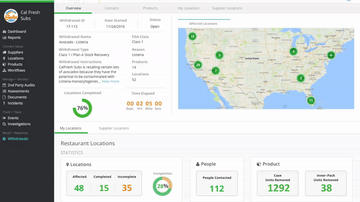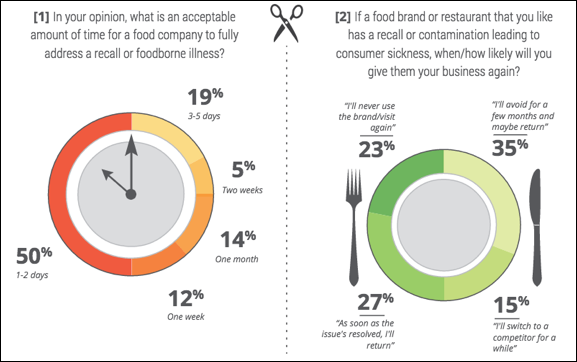The U.S. Food and Drug Administration says that the Food Safety Modernization Act (FSMA) is the “most sweeping reform of our food safety laws in more than 70 years.” FSMA became the law of the land in 2011. Some compliance deadlines have already arrived, and others are fast approaching.
Where you stand in your implementation of supply chain traceability can drastically affect how well you're able to respond to food recalls, withdrawals and general compliance. Are you ready?
More Proactive FDA Actions
FSMA is fundamentally proactive in that it shifts the emphasis from responding to food contamination to preventing it in the first place. The number of food recalls has increased in recent years, and this has further sensitized consumers to the problem of tainted food. Today, food safety compliance requirements are only one part of the equation. The need to protect one’s brand is as important as ever - and consumers are watching very closely.
Impact of Food Recalls
Consumers may reject a brand subject to a highly publicized recall. A May 2017 incident illustrates the potential for the serious adverse consequences of a recall. Food Safety News reported that Pinnacle Foods voluntarily recalled Aunt Jemima and Hungry Man waffles, French toast and pancakes due to the detection of listeria monocytogenes at its plant in Jackson, Tennessee. Just three days later, the company announced it was discontinuing the 16 products involved in the recall. One employee told a local TV station that the move could eliminate as many as 200 jobs.
This is in line with our own findings in our consumer survey - 2,000+ respondents told us exactly what they expect from a food company in a recall situation:
Ready to reduce your recall and withdrawal risk with our newest custom-built product? Recall + Response is a game-changing withdrawal and recall management solution, with input provided from food industry leaders.
Section 204 of FSMA
One part of FSMA seeks to improve capabilities to detect and respond to food safety issues. Specifically, food tracing requirements are addressed in Title II, Section 204 of the Act. This section is entitled, “Enhancing tracking and tracing of food and record keeping.”
Section 204 establishes key requirements regarding the implementation of a comprehensive, written food safety plan that addresses the following:
-
Hazard analysis
-
Preventative controls
-
Oversight and management of those controls
The oversight and management of controls includes ongoing monitoring, taking corrective actions and conducting proper verification.
For most enterprises, FSMA compliance is vitally important, and cost-effective compliance is ideal. Food traceability software streamlines the data collection and review process. Hazard analysis and critical control points (HACCP) provides a systematic, preventative approach to food safety. Food safety software that can address HACCP streamlines the process.
Effective food traceability systems ensure regulatory compliance, reduce direct and indirect recall costs, and improve consumer trust and brand value.
Food Traceability and FSMA Compliance
Many of those involved in the sourcing, preparation and packaging of food are already keenly aware of the need for tracking and transparency throughout the supply chain. Although it is possible to greatly reduce the likelihood of recalls, it is also important to have proper protocols in place should they ever occur.
Food traceability software is an indispensable tool in “farm-to-fork” tracking, particularly in this age of globalized supply chains. It's no longer enough to provide one-up and one-back traceability - your customers and C-suite want more. Ultimately, food traceability software is necessary for both compliance and competitiveness.
Watch Traceability In Action
Your traceability efforts are an essential part of the modern food supply chain. Your customers want it, and your c-suite will appreciate it. Watch our short video demo to learn how FoodLogiQ Connect can help your company.
Tag(s):
Other posts you might be interested in
View All Posts
Food Industry
6 min read
| May 18, 2017
FoodLogiQ Disrupts the Food Industry with Market’s First Real-Time Recall Management Solution
Read More
Food Industry
4 min read
| August 9, 2017
At the Crossroads of Food Safety and Consumer Transparency
Read More.png?length=360&name=adulterated%20apple%20(1).png)
Recall
10 min read
| May 23, 2017



